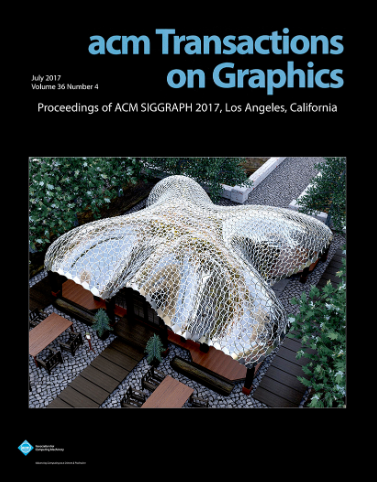Capacitive Touch Sensing on General 3D Surfaces
IF 7.8
1区 计算机科学
Q1 COMPUTER SCIENCE, SOFTWARE ENGINEERING
引用次数: 0
Abstract
Mutual-capacitive sensing is the most common technology for detecting multi-touch, especially on flat and simple curvature surfaces. Its extension to a more complex shape is still challenging, as a uniform distribution of sensing electrodes is required for consistent touch sensitivity across the surface. To overcome this problem, we propose a method to adapt the sensor layout of common capacitive multi-touch sensors to more complex 3D surfaces, ensuring high-resolution, robust multi-touch detection. The method automatically computes a grid of transmitter and receiver electrodes with as regular distribution as possible over a general 3D shape. It starts with the computation of a proxy geometry by quad meshing used to place the electrodes through the dual-edge graph. It then arranges electrodes on the surface to minimize the number of touch controllers required for capacitive sensing and the number of input/output pins to connect the electrodes with the controllers. We reach these objectives using a new simplification and clustering algorithm for a regular quad-patch layout. The reduced patch layout is used to optimize the routing of all the structures (surface grooves and internal pipes) needed to host all electrodes on the surface and inside the object's volume, considering the geometric constraints of the 3D shape. Finally, we print the 3D object prototype ready to be equipped with the electrodes. We analyze the performance of the proposed quad layout simplification and clustering algorithm using different quad meshing and characterize the signal quality and accuracy of the capacitive touch sensor for different non-planar geometries. The tested prototypes show precise and robust multi-touch detection with good Signal-to-Noise Ratio and spatial accuracy of about 1mm.一般三维表面上的电容式触摸感应
互电容感应是检测多点触控最常用的技术,尤其是在平面和简单曲率表面上。将其扩展到形状更复杂的表面仍具有挑战性,因为要在整个表面上实现一致的触摸灵敏度,就需要均匀分布传感电极。为了克服这个问题,我们提出了一种方法,使普通电容式多点触控传感器的传感器布局适应更复杂的三维表面,确保高分辨率、稳健的多点触控检测。该方法可自动计算发射器和接收器电极的网格,并在一般三维形状上尽可能规则地分布。它首先通过四网格计算出一个代理几何图形,用于通过双边缘图放置电极。然后在表面上排列电极,以尽量减少电容式感应所需的触摸控制器数量以及连接电极和控制器的输入/输出引脚数量。我们采用一种新的简化和聚类算法来实现常规四贴片布局的这些目标。考虑到三维形状的几何限制,简化后的贴片布局用于优化所有结构(表面凹槽和内部管道)的布线,这些结构是在物体表面和内部容纳所有电极所必需的。最后,我们打印出可安装电极的三维物体原型。我们使用不同的四边形网格分析了所提出的四边形布局简化和聚类算法的性能,并对不同非平面几何形状的电容式触摸传感器的信号质量和精度进行了表征。经过测试的原型显示了精确、稳健的多点触控检测,具有良好的信噪比和约 1 毫米的空间精度。
本文章由计算机程序翻译,如有差异,请以英文原文为准。
求助全文
约1分钟内获得全文
求助全文
来源期刊

ACM Transactions on Graphics
工程技术-计算机:软件工程
CiteScore
14.30
自引率
25.80%
发文量
193
审稿时长
12 months
期刊介绍:
ACM Transactions on Graphics (TOG) is a peer-reviewed scientific journal that aims to disseminate the latest findings of note in the field of computer graphics. It has been published since 1982 by the Association for Computing Machinery. Starting in 2003, all papers accepted for presentation at the annual SIGGRAPH conference are printed in a special summer issue of the journal.
文献相关原料
| 公司名称 | 产品信息 | 采购帮参考价格 |
|---|
 求助内容:
求助内容: 应助结果提醒方式:
应助结果提醒方式:


